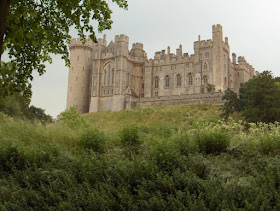Following the early death of the only legitimate son of Henry I, William, few of the English and Norman barons were prepared to stand by their oath to him to support his daughter's claim to the throne. Matilda was, after all, a woman, and was said to have been arrogant and unpopular. She was also married to the Count of Anjou. He was the ruler of Anjou- England and Normandy's traditional enemy.
When Henry died in 1135, the barons met to choose a king. Despite Matilda's having an infant son, they chose Count Theobald of Blois, the grandson of William the Conqueror by his daughter, Adela. Negotiations were in progress when Stephen, Theobald's younger brother, made himself King of England.
Stephen had been brought up by Henry I, who had loved him and made him one of the richest men in England. Stephen now pointed to this as evidence that Henry had been grooming him to become the next king, despite Henry's having obtained Stephen's oath to support Matilda. As soon as Henry was dead, Stephen sailed for England. He obtained the support of his brother, whom Henry had created the Bishop of Winchester, as well as the citizens of London. The Archbishop of Canterbury crowned him King on 22 December, 1135.
Stephen was charming, courageous and chivalrous. He became the first English king to allow jousting. He had humbly earned the people's affection and was generous toward the Church. Most of the barons and even Henry's favorite illegitimate son, Earl Robert of Gloucester (pronounced Gloster), swore allegiance to him.
Stephen was a brave soldier, but a failure as a king and commander. Because of it, Robert turned against him, and many followed. Matilda's uncle, David I of Scotland, invaded England, and though Stephen defeated David, Matilda could see that Stephen's support was bleeding away and that it was time for her to act. In an attempt to weaken King Henry's bureaucracy, which might support Matilda, Stephen arrested bishops and counselors, some of whom were his own family. This lost for him the vital support of the Church. He made strategic mistakes in battle defending his rule, not the least of which was to decide not to besiege Arundel, the castle where Matilda had taken up residence after arriving from France with Robert, and to allow her safe passage to join Robert in Bristol! Even I could have figured that one out.
Chivalrous it was, but foolish, and the result was full-scale civil war. Barons built illegal castles and plundered. They sold their allegiance to the highest bidder and then changed sides at will. Anarchy existed, and no one felt safe.
Finally Stephen was a prisoner in chains at Bristol, and Matilda rode to London to claim her throne with the help of Stephen's brother, the Bishop of Winchester. She was called Lady of the English by her supporters, but she had imposed high taxes and was still a woman, and the people would not have her. They drove her out of the city.
The Water Gate of Bristol Castle
Stephen's wife, also named Matilda for the sake of confusion, was rallying his forces. Earl Robert was captured, and the Matildas made an exchange. Henry's daughter was forced to release Stephen in exchange for her main supporter. The Bishop of Winchester had by now realigned himself with Stephen.
Matilda sent Robert to Anjou to request help from her husband. The Count was, however, engaged in a successful invasion of Normandy and could not leave. Stephen had become reconciled to the clergy, and Matilda's supporters were under threat of excommunication.
Stephen laid siege to Matilda in Oxford Castle. On a frozen, snowy night, however, she and four knights dressed in white (hers was a nightgown) and climbed down from a tower. They slipped through Stephen's lines and ran to London. The war dragged on, but five years later, Robert died and Matilda was forced to give up. She left for Anjou.
Since the Count of Anjou had taken over Normandy, some of the English barons who owned Norman estates felt that their only hope of retaining their possessions across the Channel was to support Anjou in England. They threw their support to the son of Matilda, Henry, the heir to the house of Anjou. The war continued. Stephen attempted to secure the succession of his line by having his son and heir, Eustace, crowned during his own lifetime. The Archbishop of Canterbury, however, with the Pope's backing, refused to perform the coronation.
Young Henry returned to England in 1153. He was now the most powerful feudal prince in Europe. Through inheritance and marriage, he was now Duke of Normandy and Aquitaine. He landed with a small army, and barons flocked to join him. Fear of reprisals caused the barons to conclude a peace agreement, but Stephen remained adamant that his son should succeed. When Eustace died, however, in 1153, Stephen gave up interest in the succession. Peace through the Treaty of Westminster meant that Stephen would rule till his death and that Henry was acknowledged as his heir instead of his own second son, William. Stephen did not enjoy the peace for long- he died the next year.
Henry II was crowned in 1154. Matilda lived till 1167, long enough to know of her son's succession, though she did not attend his coronation in Westminster Abbey. Matilda never returned to England.
Debra Brown is the author of The Companion of Lady Holmeshire, a Victorian mystery with sweet romance.







No comments:
Post a Comment
Note: Only a member of this blog may post a comment.